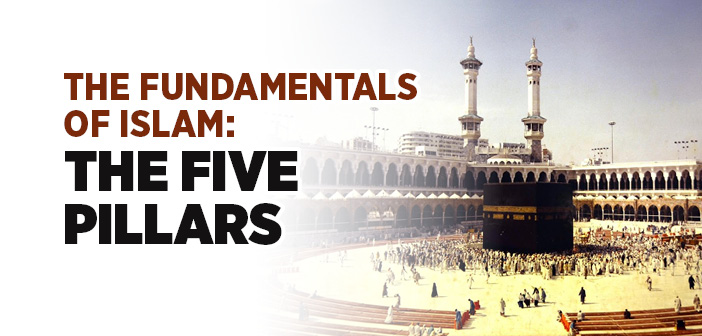What is the fundamentals of islam? What is the five pillars of islam?
The Muslims’ most important task is to initially get to know and worship (ibādah) Allah, the Almighty; Who created them, gave them life and someday will take their lives and then resurrect them. Therefore, the Muslims should accept Allah, may He be glorified and exalted, as the greatest power and the highest authority in their lives. The Lexical meaning of, ‘ibādah’ is, to submit, to obey, to worship and to adore. In Islam all types of deeds carried out with the intention to gain Allah’s Pleasure, to turn towards Allah, to establish an intrinsic relationship with Him, to be close to Him is considered ibādah; every command of His obeyed and every prohibition of His avoided, is deemed within the context of worship. It is possible to classify worship structurally under two categories: the first category consists of all kinds of work, activities and behavior performed to obey Allah’s commands and gain His pleasure. Acts such as, working and gaining a livelihood through lawful ways, performing one’s tasks in the best way possible, treating people nicely and graciously, protecting chastity, avoiding harmful habits, trying to prevent and annihilate the things that are harmful to society, protecting the environment, not littering, helping the poor and the needy, staying away from the religiously unacceptable and bad behaviors, are all recognized as worship. The second category of worship is more specific, and in this sense, worship refers to the practices that are performed in accordance with certain rituals, rules and order. Although there are many acts of worship (‘ibādah) in Islam, the five main obligatory acts of worship are called the, ‘Five Pillars of Islam’. The Prophet Muhammad (peace and blessings of Allah be upon him) said, “The structure of) Islam is built on five (pillars): Testification of ‘La ilaha illallah’ (none has the right to be worshipped but Allah), that Muhammad is his slave and Messenger, the establishment of Salat, the payment of Zakat, the pilgrimage to the House of Allah (Kabah), and Saum during the month of Ramadan.”[1] In this Hadith the Messenger of Allah (peace and blessings be upon him) gave a parable of the house of Islam which consists of five foundations or pillars. The first pillar is the declaration of faith (shahada) which states, “I testify that there is no deity but Allah, and that Muhammad is the Messenger of Allah”. The second pillar is the prescribed daily prayers (salah), the third pillar is fasting during the month of Ramadan (siyam), the fourth pillar is giving alms (zakah) and the last pillar of Islam is to undertake a pilgrimage to Mecca (hajj).At this juncture the new Muslim should appreciate the reason why he or she is obliged to worship Allah. The main and foremost aim of performing any act of worship is to be able to remember and glorify Allah, Most High; it is vital to understand that God’s majesty and glory does not depend in the slightest degree upon the praise and worship of human beings or any of His creation, rather, He is absolutely free of all such need. Instead, it is the human being who needs the recurrent forms of worship, so as to strengthen and solidify his or her faith and submission to God. By worshipping Allah, the human being gets to know Him as the Lord, has the opportunity to achieve His pleasure and through that gain Paradise. Therefore, the essence of Islam is total submission and obedience to Allah. The acts of worship referred to as the ‘pillars of Islam’, are obligatory upon all Muslims wherever they may live; these acts of worship have been specifically prescribed in the Qur’an and they are executed in the manner that the Prophet Muhammad performed them. It is stated in the Holy Qur’an that Allah created the human beings and the jinn to worship Him (al-Dhariyat, 51: 56); and consequently, to test which one of them is the best in deeds (al-Mulk, 67: 2). In this respect ‘ibādah’ in its widest sense means to live in accordance with the Divine Will and Pleasure, to obey the religious rules and values, and to maintain the relationship and the connection with Allah. According to this understanding, ‘ibādah’ does not only consist of some limited practices that are carried out at certain times and places, but, instead it is a way of understanding life making it meaningful.Before continuing any further it is important to mention two very significant details. Firstly, achieving the status of worship for a particular action or behavior depends on the performance of said action or behavior in accordance with the rules established by Allah and, with the intention and thought to obey Him and to gain His pleasure. People cannot establish a style or model of worship in accordance with their own desires and thoughts. The limits and models of right and wrong or, licit and illicit have been established by Allah, may He be glorified and exalted; these limits and models have been transmitted to us from the Prophet (peace and blessings be upon him). He implemented and practiced these rules of worship in his life and became the best example for us.Secondly, it is important for the new Muslim to be familiar with the subject of, ‘Fiqh’, which is a discipline of Islamic knowledge that encompasses the religious and legal aspects of every individual’s life, their relationship with each other, as well as, with Allah, may He be glorified and exalted. After the Prophet (peace be upon him) passed on, the most prominent of his companions took on the task of issuing rulings and judgments regarding the problems of Muslim society. They were very proficient in the Qur’an and Sunnah, and due to having the privilege of spending time with the Prophet himself, they knew the details and the purpose of every ruling. The Muslim scholars of law of the following generations followed these directions of the companions of the Prophet. Evidently, not every Muslim was expected to be able to deduct the religious rulings from the sources, so the Muslims were invited to, “Ask the people of knowledge, if you know not.”[2] Due to the differences in the conventional opinions regarding the understanding of legal aspects since the companions’ time, a number of schools of Islamic law (madhab al-fiqhiyya) developed. Presently there are four Sunni schools of law known as Hanafi, Shafi’i, Hanbali and Maliki; the majority of the Sunni Muslims living worldwide follow one of these four Sunni madhaib, which in most cases are very similar. Generally speaking a Muslim chooses to follow one of the four schools of law mentioned above and performs his or her acts of worship and deeds according to the exposition of their chosen madhab. It is important to bear in mind that a Muslim is free to change his or her madhab, however, once a change has been made, it is obligatory on the person in question, to learn the religious rulings of their newly chosen madhab in order to be able to perform worship and other duties in the correct manner. Moreover, Muslims are allowed to follow a ruling from another school of law when their own school of law does not provide an adequate answer or solution regarding a particular matter. This is permitted only in an essential and exceptional situation and it should be noted that such undertaking cannot be arbitrary. The aspects of worship mentioned below are mostly based upon Maliki fiqh, but at times, other schools of law are also mentioned.
[1].Riyadh as-Salihin, Book 9, Hadith 217.[2]. Q. 16: 43
Source: Islam For New Muslims An Educational Guide,Assoc. Prof. Amjad M. Hussain, Erkam Publications





